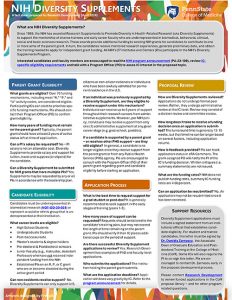Diversity, equity and belonging are fundamental to Penn State’s values and mission. The College of Medicine shares these values and mission with a commitment to foster a diverse, equitable and inclusive environment for students, faculty and staff. Research Development encourages researchers to explore the wide variety of Diversity Related Funding Opportunities available from the National Institutes of Health (NIH).
Jump to topic
Search
NIH Diversity Supplements
Principal Investigators (PIs) holding eligible NIH research grants are encouraged to consider diversity supplements to support the career development of researchers from racial and ethnic groups shown to be underrepresented in biomedical research and to support researchers from disadvantaged backgrounds. Diversity Supplements add additional funding to a parent grant to enhance a Candidate’s research skills and knowledge while undertaking research activities that relate to one or more aims of the parent grant. A key feature of Diversity Supplements is the Career Development and Mentorship Plan, which sets objectives and associated timelines for helping the Candidate make the transition to the next stage of their research career, which should include plans for the Candidate to apply for subsequent independent support (e.g., fellowships, career development awards, research grants).
All 27 NIH Institutes and Centers (ICs) participate in the Diversity Supplements Program. Read the NIH Program Announcement.
There are several benefits for Principal Investigators (PIs) who apply for Diversity Supplements:
- PIs receive additional funding to support outstanding individuals on their parent grant
- Diversity Supplements demonstrate a PI’s commitment to addressing issues of equity, diversity and inclusion
For Candidates, Diversity Supplements can be a great way to prepare for the next phase of their research careers:
- Candidates receive research experience with a faculty mentor and/or mentoring team who is committed to their career development
- The award provides salary/stipend, tuition, and insurance benefits
- Developing a Diversity Supplement applications gives Candidates hand-on experience writing NIH-grant applications
- Candidates may have opportunities to travel to national/international meetings and present their research
- Candidates may gain access to professional development/networking programs sponsored by the NIH and/or their Institute/Center (IC)
- Applications undergo administrative review at the Institute/Center (IC) level
- Proposals are not subject to peer review so the NIH resubmission policy does not apply and summary statements are not issued
- Individual ICs exercise significant discretion over program implementation:
- Parent grant eligibility
- Duration of support
- Support amounts
- Application windows and review timelines
- Number of Diversity Supplements allowed on a given parent grant
- Short review timelines (approximately 12- 16 weeks)
- Application process involves a high level of Program Officer (PO) engagement
- Applications have a relatively high funding rate greater than or equal to 60%
Candidates must be underrepresented in biomedical research (NOT-OD-20-031) or represent a racial or ethnic group that is underrepresented at their institution. Established PIs on a research project grant, program project grant, or center grant who are or become disabled during the active grant period may also request a Diversity Supplement to support reasonable accommodations (e.g., specialized equipment, assistive devices, and personnel).
Principal Investigators (PIs) are encouraged to consider Diversity Supplements for candidates at the following career levels:
- High School Students
- Undergraduate Students
- Baccalaureate and Master’s Degree Holders
- Pre-doctoral & Postdoctoral Scholars
- Junior Faculty (e.g., Instructor, Assistant Professor) who have not received independent funding from the NIH
Diversity Supplements are limited to citizens or non-citizen nationals of the United States or to individuals who have been lawfully admitted for permanent residence in the United States.
The Diversity Supplements Program Announcement recognizes over 70 eligible funding mechanisms, including most “R,” “P,” and “U” activity codes. Participating Institutes and Centers (ICs) can elect to prioritize specific funding mechanisms. PIs should contact their Program Officer (PO) to confirm the eligibility of their parent grant. In most cases, the parent grant should have at least 2 years of active status left at time of application.
Many Institutes and Centers (ICs) place caps on the maximum period of support allowed based on a Candidate’s career stage. That said, all Diversity Supplements, regardless of the issuing IC, cannot exceed the length of time remaining on the parent grant. The following table is intended to provide general guidance. PIs are strongly encouraged to confirm Candidate eligibility – and the allowable duration of support for the Candidate’s career stage – by communicating directly with the Program Officer (PO) of their parent grant.
| Candidate Career Stage | Duration of Support |
| High School Students | Up to 3 months |
| Undergraduate Students | Up to 3 months |
| Baccalaureate and Master’s Degree Holders | Up to 1 years |
| Pre-doctoral & Postdoctoral Scholars | No more than 3 years |
| Junior Faculty (e.g., Instructor, Assistant Professor) | Short-Term: 3-5 months
Long-Term: up to 2 years |
| Established Investigators Who Are or Become Disabled | Support will be limited to items that will permit the investigator to complete the remaining years of a currently funded research project |
- Download a printable Diversity Supplement Fact Sheet – Prepared by Research Development – April 2024 (Penn State login required)
- Using NIH Supplement Grants to Promote Diversity at Penn State – Webinar hosted by the Penn State Clinical and Translational Science Institute on Oct. 24, 2023
- How do Diversity Supplements Impact Careers in Biomedical & Behavioral Research? – Webinar hosted by the Chief Officer for Scientific Workforce Diversity (COSWD) at the NIH on Nov. 17, 2022
- Open Conversations about NIH Diversity Supplements – Webinar hosted by the National Institute of Neurological Disorders and Stroke (NINDS) on Jan. 13, 2021

